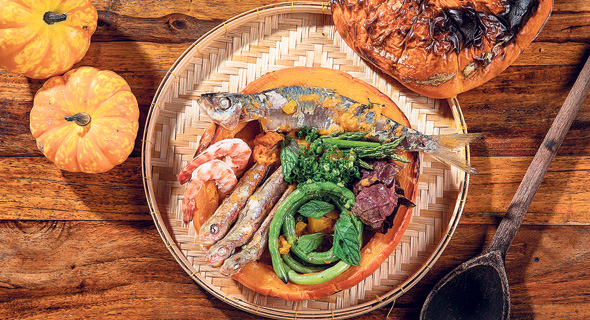Tel Aviv Restaurant Goes Biblical
Popular Tel Aviv dining spot Igra Rama goes back in time, reimagining what people in the region ate thousands of years ago
17:5011.07.19
Next week, popular central Tel Aviv restaurant Igra Rama will go back in time. Between July 14 and 18, waiters donning biblical-era outfits will serve dishes made using ancient ingredients and techniques to guests seated on straw mats.
 Fish dish with squash and fennel. Photo: Ilya Malenkov The experiment, developed as part of the city-wide Fun Dining Week initiative in which restaurants switch menus and cuisines, is an opportunity for Ben Rafael and his partner Tamir Michaeli to go way, way back. Among the dishes the duo will serve during bible week are a Tzatziki salad made with fakus, an ancient ancestor of the modern cucumber (also known as Armenian cucumber), fish stew with samphire, burnt goat cheese, and figs served with warm camel milk.
To better understand the way people ate here thousands of years ago, the Igra Rama team consulted with food archeologist Tova Dickstein and food historian Uri Mayer-Tzizik. “The menu in biblical time was mostly based on cereals, mainly wheat, barley, and buckwheat, processed and cooked into porridge or baked into bread,” Dickstein told Calcalist. “Rice only arrived in this region during the second temple period,” she said. “Meat was seldom eaten.”
Fish dish with squash and fennel. Photo: Ilya Malenkov The experiment, developed as part of the city-wide Fun Dining Week initiative in which restaurants switch menus and cuisines, is an opportunity for Ben Rafael and his partner Tamir Michaeli to go way, way back. Among the dishes the duo will serve during bible week are a Tzatziki salad made with fakus, an ancient ancestor of the modern cucumber (also known as Armenian cucumber), fish stew with samphire, burnt goat cheese, and figs served with warm camel milk.
To better understand the way people ate here thousands of years ago, the Igra Rama team consulted with food archeologist Tova Dickstein and food historian Uri Mayer-Tzizik. “The menu in biblical time was mostly based on cereals, mainly wheat, barley, and buckwheat, processed and cooked into porridge or baked into bread,” Dickstein told Calcalist. “Rice only arrived in this region during the second temple period,” she said. “Meat was seldom eaten.”
For daily updates, subscribe to our newsletter by clicking here.
“I always say that I was born in the wrong period,” Chef Aner Ben Refael told Calcalist in a recent interview. “I do not feel connected to the overindulgent consumer culture and to social media. Everyone today is so beautiful, so on vacation, so rich. It was better back when,” he said.
 Fish dish with squash and fennel. Photo: Ilya Malenkov
Fish dish with squash and fennel. Photo: Ilya Malenkov Even on regular weeks, Igra Rama’s menu is led by an agenda of local, seasonal, and manipulation-free cuisine. “We try to use the fridge as little as possible, never freeze anything, and work exclusively with the ingredients that are right for the moment,” Michaeli said. “We decided it will be interesting to look back at what existed here in the past, to hone our knowledge,” he said.
Related stories:
- Candy Company Mars Partners With JVP on Foodtech and Agtech Initiative
- Lab Beef Company Aleph Farms Raises $11.7 Million
- In Israel, There Is a Tight Bond Between Food and Politics
People living here during that period did eat watermelons, squashes, grapes, and olives, as well as plenty of fish, mostly from the Sea of Galilee. They also churned and ate a lot of butter, according to Ben Refael. The prevalence of butter in ancient Israel was one of the most surprising discoveries, he said. “All these years we got it into our heads that olive oil was the local choice, but butter was also around,” he said. “Now I’ll definitely use it more.”



